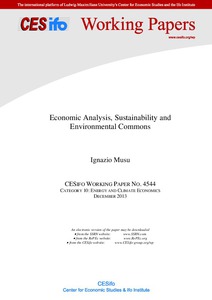Economic analysis, sustainability and environmental commons

CESifo - Munich
2013
20 p.
biodiversity ; climate change ; environment ; government policy ; sustainable development
CESifo Working Paper
Environment
English
Bibliogr.
"When confronted with market weaknesses and failures determining sustainability problems for environmental common-pool resources, economic analysis has proposed government intervention as the only alternative available. Elinor Ostrom showed that this dichotomy between market and government is not always helpful, and proposed a more complex approach to institutions focusing on an active role of communities, social norms and a polycentric system of governance. This paper summarizes the main factors at work in determining the role of institutions to deal with sustainability issues and explores the implications of this wider approach in dealing with environmental commons, particularly with global environmental commons, discussing two issues: climate change and biodiversity. Involvement of governments and a reference framework provided by intergovernmental agreements are necessary, but the difficulties of building a successful intergovernmental institutional framework require responsible and convinced actions at the level of consumers and firms, public opinion involvement in individual countries, and coordination between local and national levels of government: provided that some conditions are fulfilled, common resource management can be very helpful in achieving them."
Digital
The ETUI is co-funded by the European Union. Views and opinions expressed are however those of the author(s) only and do not necessarily reflect those of the European Union or the ETUI.